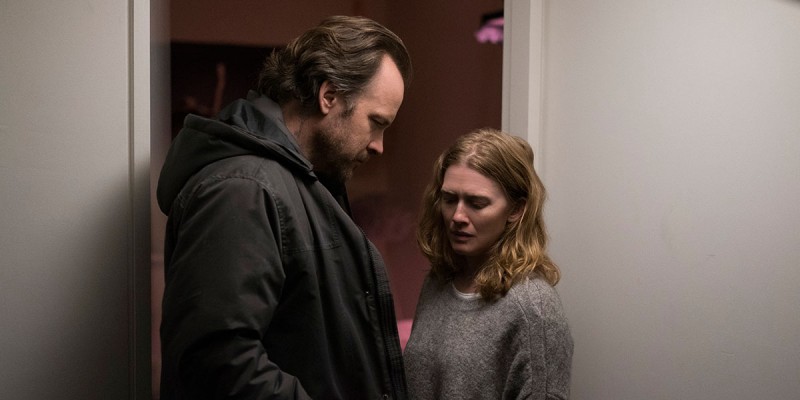All kids grow up. Some parents grow apart. And the ramifications of this combination can have drastic effects. Jealousies might crop up to cause rifts while nostalgia for times long since past try replacing a present of anger and regret. So what is there to do but deal with the pain? When the parents’ relationship devolves into acrimony, the child sees it. He/she will feel it in every fiber of his/her being. Maybe they act out in response to escape the position of diplomatic go-between keeping secrets from each separate from the other because it’s a tough reality to traverse—even more as a teenager dealing with their own emotional drama. To fantasize about divorced parents reuniting is to be disappointed when every new love interest appears to prove chances are unlikely.
This is the life Kayla (Joey King) lives within Veena Sud’s The Lie. Here she is coming into her own and yet constantly dealing with her parents’ pettiness towards each other. It’s not like there’s a parent of the year among them either. He (Peter Sarsgaard’s Jay) still plays in a band that must be at least lucrative enough to sustain him and she (Mireille Enos’ Rebecca) is a lawyer working long hours to the point of absenteeism. He’s irresponsible and overly affectionate as though he has something to prove while she’s coldly disconnected and oppressively controlling. Kayla would probably be happy if she didn’t have to stay with either since both parents’ flaws leave her wanting no matter how hard they try. So while the weekend’s ballet camp seems a chore, it does provide relief.
Except she never ends up getting there. Dad was supposed to take her and was in the process when they came up on Kayla’s best friend Brittany (Devery Jacobs). At least that’s the dynamic inferred despite their own growing sense of animosity. Brittany flirts with Jay much to her friend’s dismay and revulsion, tensions rising until a quick detour sees the girls exiting the vehicle to go to the bathroom in the surrounding snow-covered forest. A scream rings out and Jay runs from the car to find Kayla sitting on the railing of a bridge over a rapidly flowing river, Brittany nowhere to be found. His daughter is distraught, crying that it wasn’t an accident. She pushed her. She pushed her friend into the water and now there’s nothing left to do but cover their tracks.
What follows is the desperation of two parents throwing morality out the window to save their daughter. They try replaying what happened to see what can be done to distance themselves from the crime. Rebecca used to be a detective so she knows how they think, but something new pops up every time it appears they have a lid on things. It could be Brittany’s father (Cas Anvar’s Sam Ifrani) knocking on their door or Kayla’s disturbingly calm attitude that makes it appear as though she’s a sociopath without remorse. Jay and Rebecca must therefore keep expanding on their lie while running interference. They plant the seeds of abuse within the Ifrani family to lead the cops astray and ultimately find themselves much deeper than mere accessories after the fact.
It’s the sort of morally questionable conceit Sud and Enos excelled at delivering during their run leading the American version of “The Killing” behind and in front of the camera respectively. My enjoyment of that show is what allowed me to give The Lie the benefit of the doubt once things start getting overwrought and silly. Emotions are running high for all involved so there should be some weird interactions. They’re expected. The problem, though, is that they increase in regularity as the movie progresses. Kayla becomes more erratic while Jay and Rebecca prove more ruthless in their participation. Things start getting way out of hand and then go even further until the audience can’t help but snicker. I don’t mean nervous laughter either. I’m talking full-on “lost our patience” laughter.
What’s worse is that anyone who watches these types of procedural dramas should expect what’s coming (in more ways than one). Sud appears to think we won’t, though, and really leans into her decision to play everything one way only to eventually retroactively prove it was another way the whole time. So rather than feel Jay and Rebecca’s agony, we only see highly educated people making stupid decisions. And rather than see Kayla as a distraught teen in shock, we brand her a shell of a person seemingly alternating between being possessed and broken. Eventually you can’t help but unironically wonder if Sud intended to make a comedy because the mood swings and incredulity only become more and more unbelievable.
Each time something else silly happens with an obvious desire to shock rather than infuriate, a bunch of audience members laughed and a few left. It happened repeatedly until I started feeling envious of their decision to finally give up. Eventually it becomes clear that things won’t be getting better because Sud has committed to her misguided path. She follows it with rigor, turning Sarsgaard and Enos into caricatures going through the motions of a manipulative narrative wherein the stress and camaraderie of covering up a murder supplies motive for them to get closer than ever before. It’s so cheaply rendered that I half hoped we’d receive a ham-fisted ending revealing it was all a dream. And if that’s the best option, you know things have gone way off course.
The Lie screened at the Toronto International Film Festival.

